小学六年级英语一般过去时
一般过去时 六年级英语知识点

一般过去时(小学)一、定义1.表示过去某个时间发生的动作或存在的状态。
如:She ate three apples yesterday. 昨天她吃了三个苹果。
I got up at 6:30 yesterday. 我昨天6:30起床。
My father was very busy last week.我父亲上周很忙。
2.表示过去经常或过去反复发生的动作(也可与often,always等频率副词连用)。
如:He always got up very early when he was young.年轻的时候,他每天总是起得很早。
二、谓语形式:动词的过去式(1)She was a student two years ago. 两年前她是一个学生。
(这件事情已经过去了,所以be动词is要用过去式was)(2)they were students two years ago. 两年前他们/她们是学生。
(这件事情已经过去了,所以be动词are要用过去式were)(3) Ann washed her clothes last night. 安昨晚洗了她的衣服。
(这件事情已经过去了,所以动词wash要用过去式washed)(4) I did my homework promptly. 我及时地完成了作业。
(这件事情已经过去了,所以动词do要用过去式did)三、句子结构:(a) be 动词的过去式句型: (b)动词过去式句型:(a) be 动词的过去式句型:1.肯定句:主语+be 动词(was , were)+其他,如:She was a student two years ago. 两年前她是一个学生。
2.否定句:主语+be not(was not, were not)+其他,如:She was not a student two years ago. 两年前她不是一个学生。
3.一般疑问句:Be动词(Was/Were)+主语+其他?肯定回答为“Yes,主语+was/were”,否定回答为“No,主语+wasn’t/weren’t”。
小学六年级英语一般过去式语法知识点
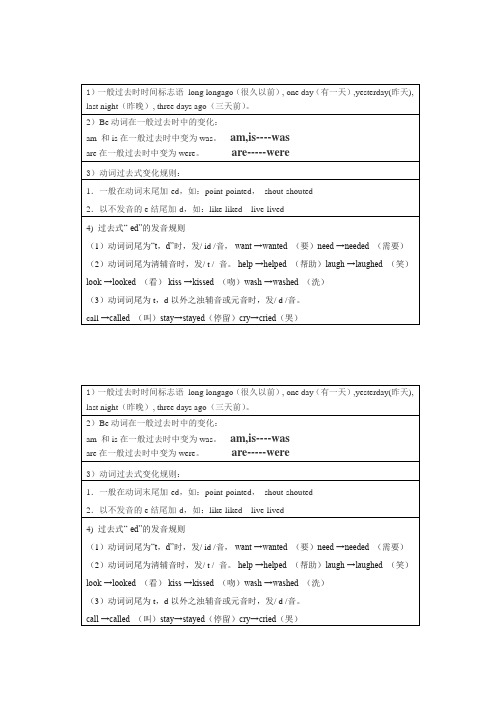
(3)动词词尾为t,d以外之浊辅音或元音时,发/ d /音。
call →called(叫)stay→stayed(停留)cry→cried(哭)
1)一般过去时时间标志语long longago(很久以前), one day(有一天),yesterday(昨天), last night(昨晚), three days ago(三天前)。
2)Be动词在一般过去时中的变化:
am和is在一般过去时中变为was。am,is----was
are在一般过去时中变为were。are-----were
3)动词过去式变化规则:
1.一般在动词末尾加-ed,如:point-pointed,shout-shouted
2.以不发音的e结尾加-d,如:like-liked live-lived
4)过去式“-ed”的发音规则
(1)动词词尾为“t,d”时,发/ id /音,want →wanted(要)need →needed(需要)
1)一般过去时时间标志语long longago(很久以前), one day(有一天),yesterday(昨天), last night(昨晚), three days ago(三天前)。
2)Be动词在一般过去时中的变化:
am和is在一般过去时中变为was。am,is----was
are在一般过去时中变为were。are-----were
(2)动词词尾为清辅音时,发/ t /音。help →helped(帮助)laugh →laughed(笑)look →looked(看)kiss →kissed(吻)wash →washed(洗)
外研社(三起)小学英语六年级下册一般过去时

Infinitive am / is are begin break bring build buy can
常见不规则动词
Past tense was were began broke brought built bought could
__D_i_d__ he __f_in_d_ ___a_n_y_ meat in the fridge?
3. She stayed there for a week.(对画线部分提问)
__H_o_w__ __lo_n_g__ __d_id__ she _s_t_ay__ there?Leabharlann That’s great!
1. Xiao Lin went fishing this morning.(改为一般疑问句) 2. We visited our teacher last night.(就画线部分提问) 3. He had lunch at school.(改为否定句) 4. There was some milk in the bottle. (就画线部分提问) 5. He went to that city with his uncle. (改为一般疑问句)
行为动词的一般过去式: a. 规则动词的变化规则: (1)一般动词直接加-ed (2)以e结尾的动词直接加-d (3)以辅音字母加y结尾的词,变y为i再加-ed (4)以重读闭音节结尾,词尾只有一个辅音字母,双写辅音字母加-ed
注:规则动词过去式的发音: 在清辅音后读/t/,在元音和浊辅音后读/d/,在辅音/t/,/d/后读 /id/。 b. 不规则动词变化需参看不规则动词表逐一熟记。
Exercise
按要求完成下列句子。
1. Lucy did her homework at home.(改为否定句)
六年级英语Therebe句型的一般过去时
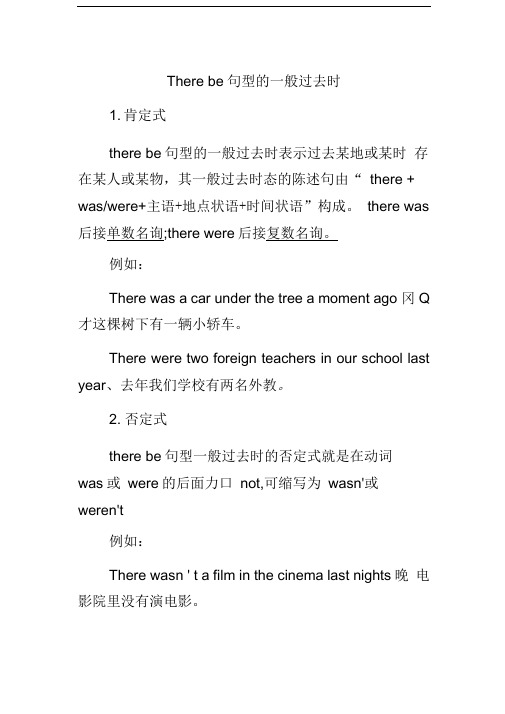
There be句型的一般过去时1. 肯定式there be句型的一般过去时表示过去某地或某时存在某人或某物,其一般过去时态的陈述句由“ there + was/were+主语+地点状语+时间状语”构成。
there was 后接单数名询;there were后接复数名询。
例如:There was a car under the tree a moment ago 冈Q 才这棵树下有一辆小轿车。
There were two foreign teachers in our school last year、去年我们学校有两名外教。
2. 否定式there be句型一般过去时的否定式就是在动词was或were的后面力口not,可缩写为wasn'或weren't例如:There wasn ' t a film in the cinema last nights晚电影院里没有演电影。
There weren ' t any women doctors the挡时没有女大夫。
3. 一般疑问式及其回答there be句型一般过去时的一般疑问式就是将动词was或were放在there之前。
肯定回答用“Yes, thre was/were、;否定回答用“No, there wasr^ ' t weren '、t”。
例如:①一Was there a man in the room just now?冈Q 才房间里有位男子不?—Yes, there was 就是的,有一位。
②一Were there any girl singers in your class last year?去年您们班有女歌手不?—No, there weren、' 不,没有。
4. 特殊疑问式及其回答there be句型一般过去时的特殊疑问式由“疑问词+ was/were+ there+地点状语+时间状语”构成, 有时地点状语与时间状语可省略。
一般过去时 六年级英语知识点

一般过去时(小学)一、定义1.表示过去某个时间发生的动作或存在的状态。
如:She ate three apples yesterday. 昨天她吃了三个苹果。
I got up at 6:30 yesterday. 我昨天6:30起床。
My father was very busy last week.我父亲上周很忙。
2.表示过去经常或过去反复发生的动作(也可与often,always等频率副词连用)。
如:He always got up very early when he was young.年轻的时候,他每天总是起得很早。
二、谓语形式:动词的过去式(1)She was a student two years ago. 两年前她是一个学生。
(这件事情已经过去了,所以be动词is要用过去式was)(2)they were students two years ago. 两年前他们/她们是学生。
(这件事情已经过去了,所以be动词are要用过去式were)(3) Ann washed her clothes last night. 安昨晚洗了她的衣服。
(这件事情已经过去了,所以动词wash要用过去式washed)(4) I did my homework promptly. 我及时地完成了作业。
(这件事情已经过去了,所以动词do要用过去式did)三、句子结构:(a) be 动词的过去式句型: (b)动词过去式句型:(a) be 动词的过去式句型:1.肯定句:主语+be 动词(was , were)+其他,如:She was a student two years ago. 两年前她是一个学生。
2.否定句:主语+be not(was not, were not)+其他,如:She was not a student two years ago. 两年前她不是一个学生。
3.一般疑问句:Be动词(Was/Were)+主语+其他?肯定回答为“Yes,主语+was/were”,否定回答为“No,主语+wasn’t/weren’t”。
(科普版)小学六年级英语一般过去时
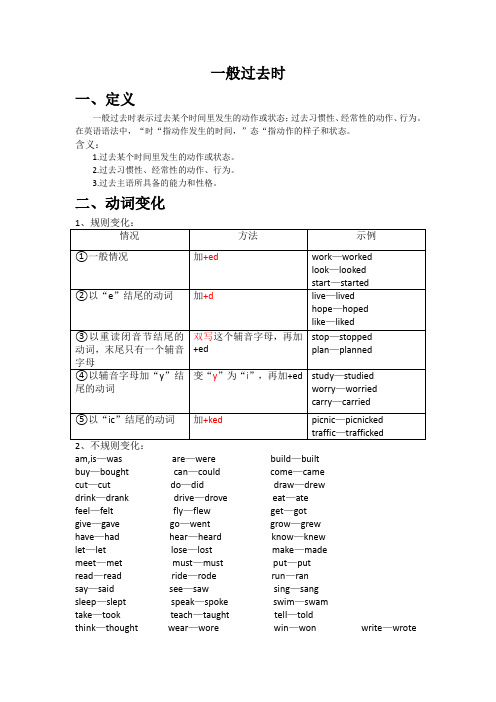
一般过去时一、定义一般过去时表示过去某个时间里发生的动作或状态;过去习惯性、经常性的动作、行为。
在英语语法中,“时“指动作发生的时间,”态“指动作的样子和状态。
含义:1.过去某个时间里发生的动作或状态。
2.过去习惯性、经常性的动作、行为。
3.过去主语所具备的能力和性格。
二、动词变化am,is—was are—were build—builtbuy—bought can—could come—camecut—cut do—did draw—drewdrink—drank drive—drove eat—atefeel—felt fly—flew get—gotgive—gave go—went grow—grewhave—had hear—heard know—knewlet—let lose—lost make—mademeet—met must—must put—putread—read ride—rode run—ransay—said see—saw sing—sangsleep—slept speak—spoke swim—swamtake—took teach—taught tell—toldthink—thought wear—wore win—won write—wrote三、句法结构当句子中出现“yesterday,last night,in1997,two days ago”等单词时,则要注意动词是否需要变过去式。
1、肯定形式主语+动词过去式+其它例句:She often came to help us in those days.I did my homework yesterday evening.2、否定形式主语+didn't +谓语动词原形+其它①was/were+not;例句:I wasn’t at home yesterday.②在行为动词前加didn't,同时还原行为动词例句:I didn't know you like coffee.3、一般疑问句①Did+主语+谓语动词原形+其它?例句:Did I do homework?②Was/Were+主语+表语?例句:Were you late yesterday?4、特殊疑问句①疑问词+ did+主语+动词原形+其它?例句:What did you do last weekend?②疑问词+was/were+主语+其它?例句:Where was he yesterday?When were you born?记忆口诀:一般过去时并不难,过去动作、状态记心间。
六年级英语一般过去时句子及翻译
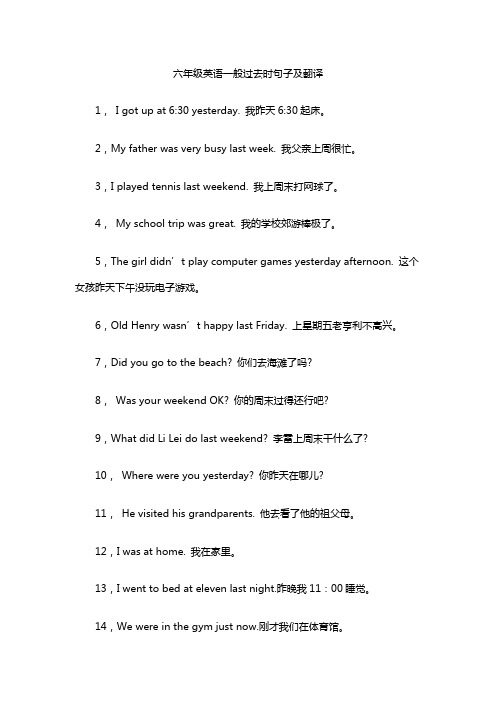
六年级英语一般过去时句子及翻译
1,I got up at 6:30 yesterday. 我昨天6:30起床。
2,My father was very busy last week. 我父亲上周很忙。
3,I played tennis last weekend. 我上周末打网球了。
4,My school trip was great. 我的学校郊游棒极了。
5,The girl didn’t play computer games yesterday afternoon. 这个女孩昨天下午没玩电子游戏。
6,Old Henry wasn’t happy last Friday. 上星期五老亨利不高兴。
7,Did you go to the beach? 你们去海滩了吗?
8,Was your weekend OK? 你的周末过得还行吧?
9,What did Li Lei do last weekend? 李雷上周末干什么了?
10,Where were you yesterday? 你昨天在哪儿?
11,He visited his grandparents. 他去看了他的祖父母。
12,I was at home. 我在家里。
13,I went to bed at eleven last night.昨晚我11:00睡觉。
14,We were in the gym just now.刚才我们在体育馆。
15,I visited my uncle yesterday.昨天我拜访了我的叔叔。
六年级 上学期 英语 闽教版(三起点) 一般过去时的概念及用法

一般过去时的概念及用法一、基本概念一般过去时(simple past tense)表示过去某个时间里发生的非持续性动作或存在的状态,也表示经常或反复发生的动作。
用动词的过去式表示,常和表示过去的时间状语连用,如:yesterday,last night,in 1990,two days ago,before,the age of等。
一般过去时也表示过去经常或反复发生的动作,常和often,always等表示频率的时间状语连用。
表示过去习惯性、经常性的动作、行为;过去主语所具备的能力和性格。
二、动词变化1.直接加ed: work—— worked look——looked2.以不发音e结尾的单词,直接加d: live ——lived hope——hoped use——used3.以辅音字母+y结尾的,变y为i加ed: study—— studied carry——carried worry——worried4.以一个辅音字母结尾的,双写最后的辅音字母+ed: stop——stopped plan——planned重读闭音节体现形式为辅-元-辅结构,例如nod, n为辅音,o为元音,d为辅音。
5. 以ic结尾的动词,要把ic变成ick再加ed,如picnic→picnicked,traffic→trafficked6.不规则变化的动词过去式:have---had are---were get---got say---said feel---feltdo/does---did is---was go---went drink--drank eat--ate bring----brought think----thought buy----bought catch---- caught teach ---- taught sit----sat wear----wore cut----cut sweep----swept sleep——slept see----saw become----became read——read7.以辅元辅结尾的加d三、用法(1)一般过去时表示在过去某个特定时间发生,也可以表示过去习惯性、经常性的动作。
六年级英语一般过去时单选题50题

六年级英语一般过去时单选题50题1. I _____ my homework yesterday.A.doB.doesC.didD.doing答案:C。
本题考查一般过去时的用法。
yesterday 是一般过去时的标志词,所以动词要用过去式,do 的过去式是did。
2. She _____ to the park last Sunday.A.goB.goesC.wentD.going答案:C。
last Sunday 是一般过去时的标志词,go 的过去式是went。
3. We _____ a great time at the party last night.A.haveB.hasC.hadD.having答案:C。
last night 是一般过去时的标志词,have 的过去式是had。
4. He _____ football with his friends yesterday afternoon.A.playB.playsC.playedD.playing答案:C。
yesterday afternoon 是一般过去时的标志词,play 的过去式是played。
5. They _____ a picnic in the park last weekend.A.haveB.hasC.hadD.having答案:C。
last weekend 是一般过去时的标志词,have 的过去式是had。
6.She ______ a lot of pictures at the school picnic yesterday.A.takeB.tookC.takesD.taking答案:B。
本题考查一般过去时的用法。
yesterday 是一般过去时的标志词,take 的过去式是took。
A 选项是动词原形,C 选项是一般现在时第三人称单数形式,D 选项是现在分词,都不符合题意。
7.They ______ a great time at the family party last weekend.A.haveB.hadC.hasD.having答案:B。
一般过去时_小学六年级英语
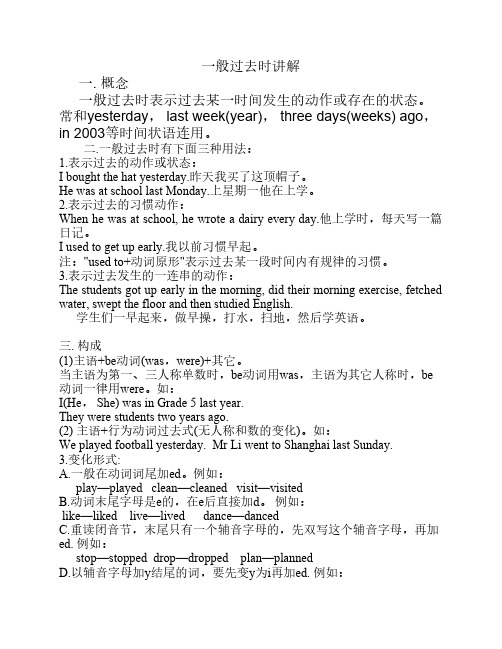
一般过去时讲解一. 概念一般过去时表示过去某一时间发生的动作或存在的状态。
常和yesterday, last week(year), three days(weeks) ago,in 2003等时间状语连用。
二.一般过去时有下面三种用法:1.表示过去的动作或状态:I bought the hat yesterday.昨天我买了这顶帽子。
He was at school last Monday.上星期一他在上学。
2.表示过去的习惯动作:When he was at school, he wrote a dairy every day.他上学时,每天写一篇日记。
I used to get up early.我以前习惯早起。
注:"used to+动词原形"表示过去某一段时间内有规律的习惯。
3.表示过去发生的一连串的动作:The students got up early in the morning, did their morning exercise, fetched water, swept the floor and then studied English.学生们一早起来,做早操,打水,扫地,然后学英语。
三. 构成(1)主语+be动词(was,were)+其它。
当主语为第一、三人称单数时,be动词用was,主语为其它人称时,be 动词一律用were。
如:I(He, She) was in Grade 5 last year.They were students two years ago.(2) 主语+行为动词过去式(无人称和数的变化)。
如:We played football yesterday. Mr Li went to Shanghai last Sunday.3.变化形式:A.一般在动词词尾加ed。
例如:play—played clean—cleaned visit—visitedB.动词末尾字母是e的,在e后直接加d。
六年级英语一般过去时单选题50题

六年级英语一般过去时单选题50题1. I ______ my homework yesterday.A. doB. didC. doesD. doing答案:B。
本题考查一般过去时的用法,yesterday 是一般过去时的标志词,所以要用动词的过去式,do 的过去式是did,A 选项do 是原形,C 选项does 是第三人称单数形式,D 选项doing 是现在分词,不符合一般过去时的要求。
2. She ______ to school by bike last week.A. goesB. wentC. goD. going答案:B。
last week 表明是一般过去时,go 的过去式是went,A 选项goes 是第三人称单数形式,C 选项go 是原形,D 选项going 是现在分词,都不符合一般过去时。
3. They ______ football in the park last Sunday.A. playB. playedC. playsD. playing答案:B。
last Sunday 是一般过去时的标志,play 的过去式是played,A 选项play 是原形,C 选项plays 是第三人称单数形式,D 选项playing 是现在分词,均不符合一般过去时。
4. My father ______ TV last night.A. watchB. watchedC. watchesD. watching答案:B。
last night 提示用一般过去时,watch 的过去式是watched,A 选项watch 是原形,C 选项watches 是第三人称单数形式,D 选项watching 是现在分词,都不正确。
5. We ______ a good time at the party yesterday.A. haveB. hadC. hasD. having答案:B。
yesterday 表明此句要用一般过去时,have 的过去式是had,A 选项have 是原形,C 选项has 是第三人称单数形式,D 选项having 是现在分词,均不符合一般过去时的语法规则。
2023年小学英语六年级小升初语法总复习(三)一般过去时 (译林版含答案)
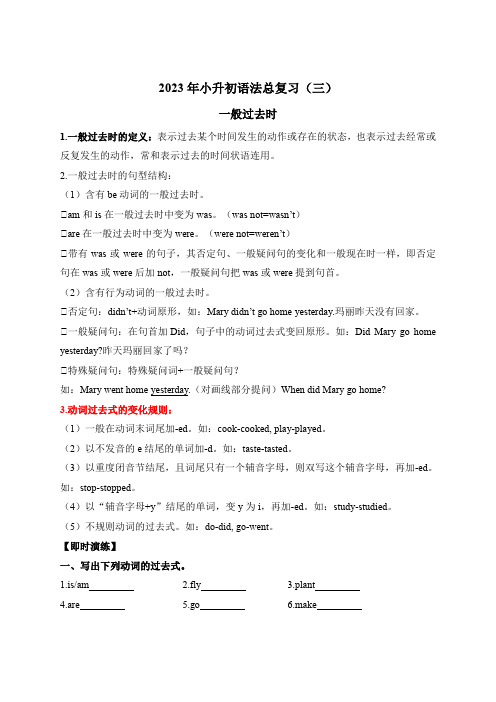
2023年小升初语法总复习(三)一般过去时1.一般过去时的定义:表示过去某个时间发生的动作或存在的状态,也表示过去经常或反复发生的动作,常和表示过去的时间状语连用。
2.一般过去时的句型结构:(1)含有be动词的一般过去时。
①am和is在一般过去时中变为was。
(was not=wasn’t)①are在一般过去时中变为were。
(were not=weren’t)①带有was或were的句子,其否定句、一般疑问句的变化和一般现在时一样,即否定句在was或were后加not,一般疑问句把was或were提到句首。
(2)含有行为动词的一般过去时。
①否定句:didn’t+动词原形,如:Mary didn’t go home yesterday.玛丽昨天没有回家。
①一般疑问句:在句首加Did,句子中的动词过去式变回原形。
如:Did Mary go home yesterday?昨天玛丽回家了吗?①特殊疑问句:特殊疑问词+一般疑问句?如:Mary went home yesterday.(对画线部分提问)When did Mary go home?3.动词过去式的变化规则:(1)一般在动词末词尾加-ed。
如:cook-cooked, play-played。
(2)以不发音的e结尾的单词加-d。
如:taste-tasted。
(3)以重度闭音节结尾,且词尾只有一个辅音字母,则双写这个辅音字母,再加-ed。
如:stop-stopped。
(4)以“辅音字母+y”结尾的单词,变y为i,再加-ed。
如:study-studied。
(5)不规则动词的过去式。
如:do-did, go-went。
【即时演练】一、写出下列动词的过去式。
1.is/am2.fly3.plant4.are5.go6.make7.taste 8.throw 9.ask10.buy 11.bring 12.draw13.kick 14.dance 15.catch16.play 17.drink 18.put二、用所给动词的适当形式填空。
小学六年级英语【一般过去时的用法】

一般过去时的用法一、概念表示在的过去某个时间里所发生的动作或存在的状态。
通常在句子里找到表示过去时间的词或词组。
如:yesterday,yesterday morning,yesterday afternoon,yesterday evening,the day before yesterday(前天),last night,last week,last month,last year,a momentago(刚才),just now(刚才),two days ago,a week ago,in 1990等。
如:I went to bed at eleven last night.昨晚我11:00睡觉。
四、动词过去式的构成规律(一)规则动词的过去式1.一般情况下,在动词原形后面加-ed;look→lookedplay→playedstart→startedvisit→visited2.以不发音e结尾的动词,在词尾直接加-d;live→liveduse→used3.以“辅音字母+ y”结尾的动词,先将y改为i ,再加–ed;study→studied, try→triedfly→flied4.以重读闭音节(即辅音+元音+辅音)或r音节结尾,末尾只有一个辅音字母的动词,要先双写这个辅音字母后,再加–ed。
stop→stoppedplan→planned, prefer→preferred(二)不规则动词的过去式1.改变动词中的元音;begin→begandrink→drankcome→cameeat→ategrow→grewrun→ranknow→kn ewwin→wonspeak→spoketake→tookwrite→wroteget→got2.变词尾的–d为–t;build→builtlend→lentsend→sentspend→spentbend→bent3.与动词原形一样;cut→cutput→putcost→costhurt→hurtshut→shut4.变-ay为-aid (少数动词);say→saidpay→paidlay→laid5.采用不同词根;sell→soldteach→taughtbuy→bought6.其他。
小学六年级一般过去时简单总结

小学六年级一般过去时简单总结一般过去时1.一般过去时表示过去某个时间发生的动作或存在的状态,常和表示过去的时间状语连用。
如:last week , last year , yesterday 等,也可以表示过去经常发生的动作,常和often,always 等频率副词连用。
例如:I saw him in the supermarket yesterday. 昨天我在超市里看见他了。
Mike always went to school on foot last term. 上学期迈克总是步行上学。
2.句型:询问在过去的某一个时间做了什么,借助助动词did 。
特殊疑问句——What did you do yesterday / last weekend ? ——I did my homework .一般疑问句,把did提前——Did you help your parents clean the room ? ( 当句子变为一般疑问句,动词应还原成动词原形) ——Yes , I did ./No, I didn’t .一般过去时1. 一般过去时表示过去某个时间发生的动作或存在的状态,常和表示过去的时间状语连用。
如:last week , last year , yesterday 等,也可以表示过去经常发生的动作,常和often,always 等频率副词连用。
例如:I saw him in the supermarket yesterday. 昨天我在超市里看见他了。
Mike always went to school on foot last term. 上学期迈克总是步行上学。
2.句型:询问在过去的某一个时间做了什么,借助助动词did 。
特殊疑问句——What did you do yesterday / last weekend ? ——I did my homework .一般疑问句,把did提前——Did you help your parents clean the room ? ( 当句子变为一般疑问句,动词应还原成动词原形) ——Yes , I did ./No, I didn’t .。
新标准英语六年级下册时态专题复习—一般过去时

新标准英语六年级下册时态专题复习—一般过去时(有be 无实义动词,有实义动词无be)一、巧记一般过去时:动词一般过去时,表示过去发生的事;be用was或用were, have,has变had;不含be动词时:谓语动词过去式,过去时间作标志;一般动词加-ed,若是特殊得硬记。
否定句很简单,主语之后didn’t添;疑问句也不难,did放在主语前;如果谓语之前有did,谓语动词需还原;含be动词时:动词若是was,were,否定就把not添。
疑问句也不难,要把was,were放在主语前。
二、be的一般过去时:学习动词be的一般过去时,下面有一口诀,它可以帮你们更好地掌握动词be的一般过去时。
be的过去时有四巧:一是时间状语巧,表示过去的短语要记牢;二是形式巧,单数was,复数were;三巧是否定句结构,not紧跟was/were;四是疑问句式巧,was/were向前跑(提前)。
【一巧】时间状语(即标志词)巧。
一般过去时表示过去发生的动作或存在的状态,恰巧与表示过去的一些时间状语连用。
1.yesterday或以其构成的短语:yesterday morning(afternoon, evening)等;2.由“last+时间名词”构成的短语:last night, last year (winter, month, week);3.由“时间段+ago”构成的短语:a moment ago,a short time ago, an hour ago等;4.其它:just now等5.由某些表示过去时态的从句等。
【二巧】形式巧。
它与一般现在时一样,形式多样:当主语是第一人称单数或第三人称单数时,谓语动词用was;主语是第二人称或其他人称复数时,谓语动词用were。
例如: I was in the classroom yesterday morning.昨天早上我在教室里。
He was at school last Tuesday.上周二他在学校。
牛津小学英语六年级上册
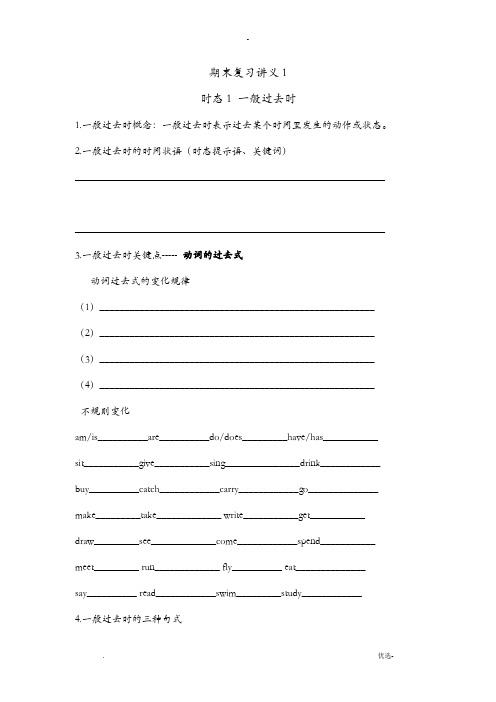
期末复习讲义1时态1 一般过去时1.一般过去时概念:一般过去时表示过去某个时间里发生的动作或状态。
2.一般过去时的时间状语(时态提示语、关键词)____________________________________________________________________________________________________________________________ 3.一般过去时关键点----- 动词的过去式动词过去式的变化规律(1)_______________________________________________________ (2)_______________________________________________________ (3)_______________________________________________________ (4)_______________________________________________________不规则变化am/is__________are__________do/does_________have/has___________ sit___________give___________sing_______________drink____________ buy__________catch____________carry____________go______________ make_________take_____________ write___________get___________ draw_________see_____________come____________spend___________ meet_________ run_____________ fly__________ eat______________say__________ read____________swim_________study____________4.一般过去时的三种句式(1)称述句与否定句含有be动词:was/were 构成例如I was there last week. 我上周在那里。
小学六年级英语一般过去时的用法总结
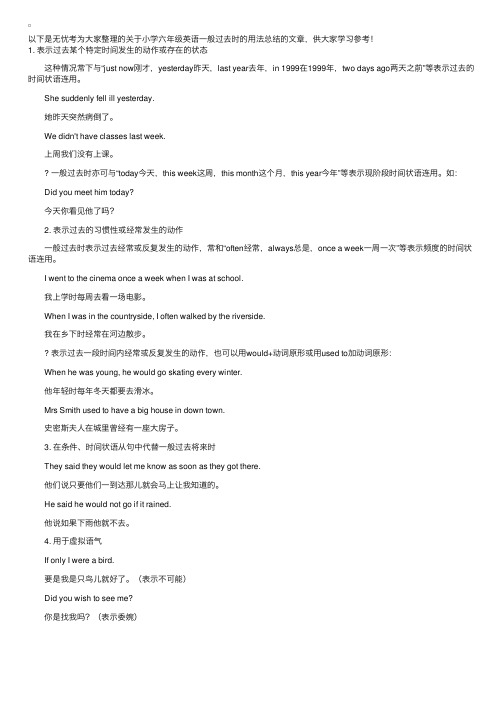
以下是⽆忧考为⼤家整理的关于⼩学六年级英语⼀般过去时的⽤法总结的⽂章,供⼤家学习参考!1. 表⽰过去某个特定时间发⽣的动作或存在的状态 这种情况常下与“just now刚才,yesterday昨天,last year去年,in 1999在1999年,two days ago两天之前”等表⽰过去的时间状语连⽤。
She suddenly fell ill yesterday. 她昨天突然病倒了。
We didn't have classes last week. 上周我们没有上课。
? ⼀般过去时亦可与“today今天,this week这周,this month这个⽉,this year今年”等表⽰现阶段时间状语连⽤。
如: Did you meet him today? 今天你看见他了吗? 2. 表⽰过去的习惯性或经常发⽣的动作 ⼀般过去时表⽰过去经常或反复发⽣的动作,常和“often经常,always总是,once a week⼀周⼀次”等表⽰频度的时间状语连⽤。
I went to the cinema once a week when I was at school. 我上学时每周去看⼀场电影。
When I was in the countryside, I often walked by the riverside. 我在乡下时经常在河边散步。
? 表⽰过去⼀段时间内经常或反复发⽣的动作,也可以⽤would+动词原形或⽤used to加动词原形: When he was young, he would go skating every winter. 他年轻时每年冬天都要去滑冰。
Mrs Smith used to have a big house in down town. 史密斯夫⼈在城⾥曾经有⼀座⼤房⼦。
3. 在条件、时间状语从句中代替⼀般过去将来时 They said they would let me know as soon as they got there. 他们说只要他们⼀到达那⼉就会马上让我知道的。
- 1、下载文档前请自行甄别文档内容的完整性,平台不提供额外的编辑、内容补充、找答案等附加服务。
- 2、"仅部分预览"的文档,不可在线预览部分如存在完整性等问题,可反馈申请退款(可完整预览的文档不适用该条件!)。
- 3、如文档侵犯您的权益,请联系客服反馈,我们会尽快为您处理(人工客服工作时间:9:00-18:30)。
第十七讲一般过去时
一. 概念
一般过去时表示过去某个时间发生的动作或存在的状态,常和表示过去的时间状语连用。
一般过去时也表示过去经常或反复发生的动作。
例句:
watched TV last night.
我昨天晚上看电视。
did you do yesterday
你昨天做了什么
went to Beijing last year.
他们去年去了北京。
二.用法
1.表示过去发生的动作或状态,通常会有明确的表示过去的时间状语。
I went to the zoo yesterday.
I stayed up last night.
2.叙述过去连续发生的动作或状态。
This morning , I got up early , went out for a walk , then came back and cooked for my family .
3.表示过去某一段不确定的时间内发生的动作或状态。
He worked in the store for 5 years.
三.Be动词在一般过去时中的变化
1. am 和is在一般过去时中变为was。
(was not=wasn't)
2. are在一般过去时中变为were。
(were not=weren't)
3. 带有was或were的句子,其否定、疑问的变化和is, am, are一样,即否定句在was
或were后加not,一般疑问句把was或were调到句首。
四.句中没有be动词的一般过去时的句子
1.否定句:didn't +动词原形,如:
Jim didn't go home yesterday.
2.一般疑问句:在句首加did,句子中的动词过去式变回原形。
如:
Did Jim go home yesterday
3.特殊疑问句:疑问词+一般疑问句如:
What did Jim do yesterday
五.动词过去式变化规则
1.一般在动词末尾加-ed,如:pull-pulled, cook-cooked
2.结尾是e加d,如:taste-tasted
3.末尾是辅音字母加一个元音字母和一个辅音字母的重读闭音节,应双写末尾的辅音字母,
再加-ed,如:stop-stopped
4.以“辅音字母+y”结尾的,变y为i,再加-ed,如:study-studied
六.真题再现
( ) 1. The boy the tree last week.
A. is watering
B. waters
C. watered
2. I _____(see) his name in the newspaper yesterday.
因为句中出现了表示过去的时间状语last week和yesterday,所以正确答案分别为:1. C
精点精练
一、用动词的适当形式填空。
1. It __________ (be) Ben's birthday last Friday.
2. We all __________ (have) a good time last night.
3. He __________ (jump) high on last Sports Day.
4. She likes __________newspapers, but she __________ a book yesterday. (read)
5. He __________ football now, but they __________ basketball just now. (play)
6. Jim's mother __________ (plant) trees just now.
7. __________ they __________ (sweep) the floor on Sunday No, they __________.
二、句型转换。
1. Tom took some photos on the Sports day.
否定句:________________________________________________
一般疑问句:____________________________________________
2. Nancy went to school early.
否定句:________________________________________________
一般疑问句:____________________________________________
3. We sang some English songs.
否定句:________________________________________________
一般疑问句:____________________________________________
4. They were in his pocket.
否定句:________________________________________________
一般疑问句:____________________________________________
肯定回答:______________________________________________
模拟预测
一、用动词的适当形式填空。
1. It __________ (be) the 2nd of November yesterday.
Mr White __________ (go) to his office by car.
2. Gao Shan __________ (put) the book on his head a moment ago.
3. What __________ you __________ just now I __________ some housework. (do)
4. They __________ (make) a kite a week ago.
5. I want to __________ apples. But my dad __________ all of them last month. (pick)
6. __________ he __________ the flowers this morning Yes, he __________. (water)
7. The students often __________ (draw) some pictures in the art room.
二、中译英。
1. 我的故事书刚才还在手表旁边。
My storybook __________ beside the watch ___________ _________.
2. 他们的外套上个礼拜放在卧室里了。
Their __________ __________ in the bedroom __________ __________.
3. 格林先生去年住在中国。
Mr Green __________ __________ China __________ __________.
4. 昨天我们参观了农场。
We __________ a farm __________.
5. 他刚才在找他的钢笔。
He ______ ______ his _________ _______ now.
6. 他上个周末走亲访友了吗是的。
__________ he __________his _________ and __________ last __________
Yes, he __________.
7. 你们上个儿童节做了什么我们参观了动物园。
What __________ you __________ last __________ __________ We __________ the zoo.
8. 你上周在哪儿在番禺。
Where __________ you __________ __________ I __________ in Panyu.。
